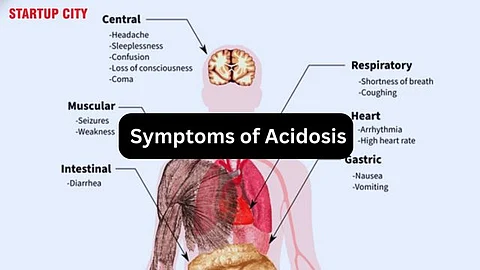

Acidosis is a medical condition characterised by an imbalance in the acidity levels of body fluids, resulting in an excess of acid. It stands in contrast to alkalosis, where there is an excess of base in the body fluids. This imbalance can have serious implications on overall health and requires prompt attention and treatment.
In this article, we delve into the various aspects of acidosis, including its causes, symptoms, diagnosis, and treatment options.
The balance of acids and bases in the body is meticulously regulated by the kidneys and lungs. Acidosis occurs when there is an accumulation of acid or a loss of bicarbonate, a base, in the body. There are two primary types of acidosis: respiratory and metabolic.
This type of acidosis occurs when there is an excess of carbon dioxide (an acid) in the body due to inadequate removal through breathing. Various factors can contribute to respiratory acidosis, such as chest deformities, lung diseases, neuromuscular disorders, or overuse of sedative drugs.
Metabolic acidosis arises from the overproduction of acid in the body or the kidneys' inability to excrete enough acid. It can result from conditions like diabetic ketoacidosis, kidney disease, lactic acidosis, poisoning, severe dehydration, or prolonged lack of oxygen.
The symptoms of acidosis can vary depending on its type and underlying cause. In metabolic acidosis, rapid and deep breathing, confusion, headache, and lethargy are common symptoms.
Respiratory acidosis symptoms may include confusion, fatigue, shortness of breath, coughing, vomiting, high heart rate and sleepiness. Severe cases of metabolic acidosis can lead to shock or even death.
Diagnosing acidosis involves a thorough physical examination and various tests to determine the underlying cause and type of acidosis. These may include arterial or venous blood gas analysis, basic metabolic panel, blood ketones, lactic acid test, urine ketones, urine pH, chest x-ray, CT abdomen, and urinalysis.
The primary goal of treating acidosis is to tackle the root cause of the pH imbalance. Sodium bicarbonate may be administered in certain instances to lower blood acidity, complemented by intravenous fluids to rebalance electrolyte levels.
The treatment strategy adopted will be tailored to the type and severity of acidosis present, as well as the patient's overall health status.
Untreated acidosis can be dangerous, but many cases respond well to treatment. The prognosis depends on the underlying condition causing the acidosis. Complications vary based on the specific type of acidosis but can include organ damage or failure if left unmanaged.
If experiencing symptoms suggestive of acidosis, it is essential to seek medical attention promptly. Prevention strategies for acidosis depend on addressing the underlying causes.
Many cases of metabolic acidosis can be prevented through effective management of conditions such as diabetes and maintaining overall kidney and lung health.
In conclusion, acidosis is a serious medical condition that requires careful attention and treatment.
Understanding its underlying mechanisms, symptoms, diagnostic approaches, and treatment modalities is crucial for the effective management and prevention of complications associated with this condition.
Always consult with healthcare professionals for proper evaluation and management of acidosis and its underlying causes.